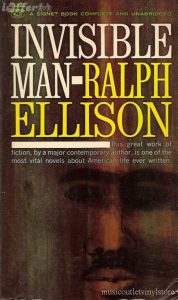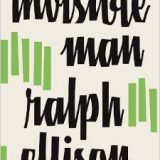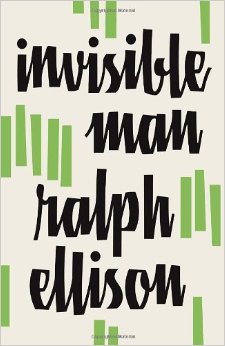Invisible Man – Ralph Ellison – 1952

Reviewed by: Michel Aaij Date: 20 April 2003
Ellison’s “Invisible Man” (IM) is, indeed, an American classic. That does not mean that it is the best book ever written, for it isn’t–it lacks a certain je ne sais quoi, perhaps a certain directness, in that one rarely feels quite close to the narrator. Of course, that may be cause I’m a white boy, and perhaps I can’t dig well enough what the invisible narrator/protagonist feels and says. On the other hand, the book’s final sentence, “Who knows but that, on the lower frequencies, I speak for you?”, indicates that I should be able to feel spoken for. I don’t yet; maybe I will, given more time.
The true miracle is not that IM escaped censorship (a highly overrated notion), but that it became hailed as a masterpiece so soon. After all, it is not a pleasant book, certainly not for Ellison’s white contemporaries, certainly not for those who affiliated themselves with the Marxist “brothers” Ellison denounces. His renunciation of this brotherhood must have struck a jarring note for sympathisers of those affected by the anti-communist witch hunts of the 1950s–and this is perhaps what is most powerful, for me: Ellison goes his own way, regardless of political sympathies or correctness.
In a sense, IM is the reverse of Washington’s “Up From Slavery”: gone is the optimism on which the Tuskegee school was started, but it is not replaced with the militant activism of the later Malcolm. It is also the reverse of the topography of Stowe’s “Uncle Tom’s Cabin”: no longer is the North the way to freedom. Instead, the idea that self-education and accommodation away from slavery can lead to self-reliance and intellectual freedom (Ellison’s critique of both Washington and Emerson) is replaced by a more nihilistic disappointment in all kinds of politics, a disappointment only moderately alleviated by the personal appeal of an author to a reader.
Great book, important book, essential book–should be read in every freshman lit class in the US.

Reviewed by: Bill Stratton Date: 20 September 2002
Although this is a fairly long work, I consider it one of the richest works I have ever read. In terms of sheer information and hidden subversiveness, this book is a rare treat for those who like to dig deep beneath the surfaces and find what is hidden there. Invisible Man is not merely a work about an alienated African American in post war society, it is also the story of American history, and the racism that has been ever present on the surface and veiled beneath the harmless guise of tradition. The fact that Ellison produced such a biting critique of American society, and was able to get it published, is a miracle in itself. ‘Invisible Man’ is a powerful statement against the de-humanizing effects of racism in America. Through elaborate symbolism and metaphor Ellison goes about the huge task of trying to expose the rampant institutional and societal racism that manifested itself in practically every corner of American culture.
Through the anonymous character of the Invisible Man, we are taken on a tour that begins in the outwardly racist South and ends in the supposedly progressive Eastern city of New York and Harlem. What the Invisible Man discovers about America in his journey is both a powerful social commentary and harsh indictment of the nature of human ignorance and hatred.
The Invisible Man is certainly not an easy read, because of the threat of censorship Ellison was forced to submerge his subversive message under the appearance of mild criticism. The result is an extremely deep and complex novel, which is often charged with double-meaning, allusion, and symbolism. One is amazed at the ingenuity and invention that Ellison employed in this work, and equally impressed at the final result.
Finally, Invisible Man testifies to the fact that people can overcome racism, prejudice, and hatred, and yet it is at the same time disheartening to see what extreme lengths Ellison had to go in order to express his views, which inherently affects the readers of his novel as well. Although Ellison was able to get his message published, he was forced to do so under a veil of darkness, one that has effectively muffled his message to a great portion of his readers. Consequently, his ultimate triumph is partial and bittersweet.
There are many things in this book that are easily overlooked; it is one that requires much thought and investigative inquiry. “Invisible Man” is best read more than once, while keeping in mind the subversive nature of Ellison’s critique and the extreme methods he was forced to employ in doing so. In opening yourself to the necessary ambiguity, or as Derrida might say, the “play” of Ellison’s text his message will continue to be heard, which represents an important and underrepresented voice of our American past. This book is a joy to read and provides invaluable insight to a period of American history that most people know little about. In my estimation Invisible Man is one of the greatest books written in the annals of American literature, a representation of American ingenuity and independence at its finest.














